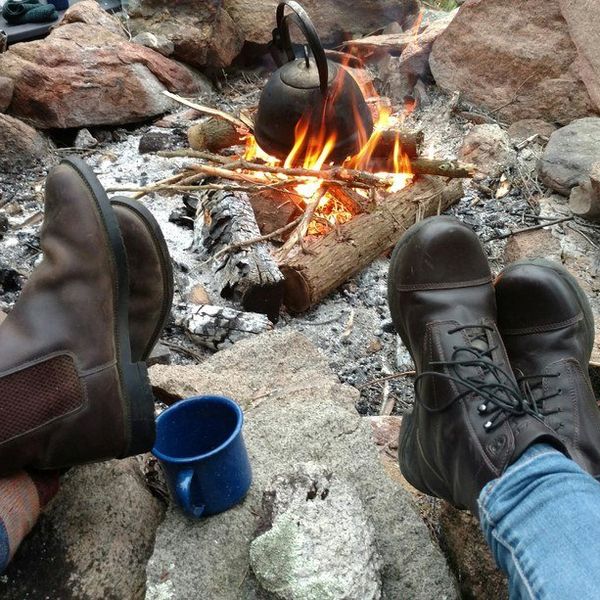Last summer, I took a week-long trip to Paris. A close friend from high school invited me to stay with her in the apartment she was renting for the summer. I spent my week touring, exploring, dining, and shopping—all the expected wonderful things. But there was one day that showed me what I had never understood about that clichéd magic of Paris.
During my visit, I quickly discovered the Shakespeare and Company bookstore in the center of Paris right across from Notre Dame Cathedral. I was immediately enamored. I went to the bookstore several times that week, to read upstairs in the rooms full of old books, or to leave messages on their vintage typewriters (which had a different key arrangement than our American keyboards), or to eat at the cafe next door and gaze at Notre Dame across the street, through a stream of bikers, buses, and pedestrians. One day a street musician played Saxophone for thirty minutes or so as I drank iced tea.
One day at Shakespeare and Co., I wandered upstairs and came across a man sitting on an upholstered bench in a smaller side-room. Gathered around him were several people—a man and a woman sitting on the piano bench across the room, a younger teenage-looking girl (who I later discovered was Chinese, and fluent in German and English), an older woman, and now, me. I walked into what I assumed was a guest lecture or reading. I slipped into the back of the room, when immediately the man speaking addressed me. He invited me to come closer in a thick accent and he tipped his fedora at me as I approached.
The fedora man was talking about philosophy—everything from God to the French Revolution, with whiffs of Plato in between. We got to talking about music and over the course of the conversation I realized I had not encountered a lecture, but a spontaneous gathering of people discussing whatever arose among them. As we talked about music and why it moves us, the fedora man asked the man at the piano bench to play. They explained that he had been playing when the conversation started—the conversation had begun as a few peoples’ compliments to the playing. He played a few pieces for us, and the woman next to him introduced herself as his wife. After he’d played his fill, I was visibly moved by the music, and the fedora man asked if I knew how to play. I said no, but I do sing, and he asked me to sing for the group.
Now, while I am not shy in everyday interactions, I do have a proclivity for stage-fright and anxiety when put on the spot. As Eliza Schuyler sings in Hamilton, “I have never been the type to try and grab the spotlight,” but the whole group joined in asking, and I didn’t know what to do. I was a tad nervous from the get-go and it was just a matter of time before I became even more so. But as I stood there, the knee-knocking didn’t come. I could breathe easily and I wasn’t sweating through my sundress. After a pause, I conceded. I pulled a version of “Caro Mio Ben” from my Choir memory-bank, and began singing, letting muscle memory supply rhythm and dynamic motion. The whole time I sang I felt like I wasn’t standing there at all, like I was someone else watching myself sing from a vast distance. I guess it was a sort of out-of-body experience. It’s nearly impossible to describe and difficult even to remember exactly how I felt in those short two minutes. My voice shook a little in the middle, but the smiles and books and golden evening light egged me on and soon I was enjoying myself. This moment didn't feel like a performance.
People clapped as I finished, and I descended from my momentary cloud formed from reverie and sunset and song. I felt my heartbeat slow and I wiped my palms on the side of my dress. Immediately I could not believe what I had just done, and a combination of nerves, modesty, and disbelief assailed me. We eventually parted ways and I returned to the apartment.
Looking back, I don’t know how or why it happened. It seems so natural, so obvious that I would sing for them—we had been engaged in dialogue and intellectual intimacy, and in a way, we knew one another. Yet at the same time, it feels other-worldly. I am no performer, and this was a small crowd of strangers, along with everyone else in the store who could hear me from other rooms. It seems bizarre that I would sing a solo for strangers in a crowded bookstore. All I know for sure is that it could only have happened right then, right there, in that top room of Shakespeare and Company bookstore, among those people, beside the old piano and antique Royal. It was a singular moment for me. I never place much stock in fate or coincidence, but I allow that memory to nestle in my mind as an anomaly, a thing apart from reason, perhaps never to be explained.
Only in Paris. I am lonesome without the city of lights, and I tug again and again at that memory. A memory like a handmade quilt worn with age and use but nonetheless belovéd.





















